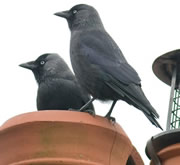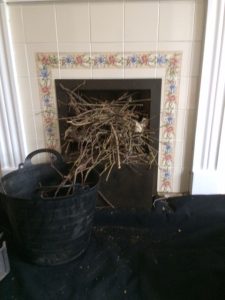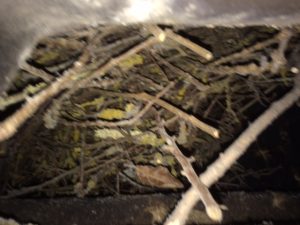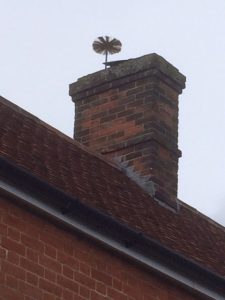Those pesky Rooks and Jackdaws have been at it again, is it a world conspiracy against chimney sweeps??? Do our feathered friends think that a busy sweep doesn’t have enough work to do so they go around creating more work everywhere. It’s a kind of natural job creation I suppose! And who can actually blame them, chimneys offer a warm, sheltered place to nest and rear their young.

Nest building in UK chimneys would appear to be predominantly a feature of the crow families’ nesting habits and involves them posting large quantities of varying size sticks down chimneys until the lodge somewhere in the chimney (frequently right at the bottom if there are no significant turns in the chimney). In this case the particular farmhouse chimney was 10 and a half meters tall and was filled from top to bottom with nest material. This can clearly be seen in the photo’s. The problem with these birds is that once they have found a suitable chimney for nesting, they tend to return to that chimney to nest year after year.

Interestingly, the Crow family, or to give them their Latin taxonomic name Corvidae family include; crows, ravens, rooks, jackdaws, jays, magpies, treepies, choughs, and nutcrackers. The crow family are singled out for their somewhat remarkable intelligence. Specifically, members of the family have demonstrated self-awareness in mirror tests (European magpies) and tool-making ability (e.g., crows and rooks), skills which until recently were thought to be possessed only by humans and a few other higher mammals. Their total brain-to-body mass ratio is equal to that of non-human great apes and cetaceans, and only slightly lower than that of humans.
I do get asked to remove birds nests with a great frequency, however this can only be done after August when the young have fledged, its actually illegal to remove a nest whilst the birds are nesting. The piece of legislation that covers bird’s nests is ‘The Wildlife & Countryside Act 1981’, The Act states that it is an offence to:
Intentionally kill, injure or take any wild bird
Intentionally take, damage or destroy the nest of any wild bird
while that nest is in use or being built
Penalties for breaking the law include large fines, or up to 6 months imprisonment or both!
According to James from the Edinburgh’s Bricklayers and Masonry Co, birds pose a far bigger risk than people assume. Having birds’ in your chimney can lead to dangerous blockages, chimney fires, infestations and damp. Even if you don’t intend to use your fireplace – you should still remove a nest. A nest will completely block your chimney, this can cause damp issues in the form of condensation build up. The chimney should be vented at both the top and the bottom as air is still allowed to flow through the chimney.
Nick Stokes, Main Editor at HeatWhiz.com, adds: “Besides the discomfort of birds chirping in your fireplace, the birds can actually infest your home with other harmful pests. Insects like ticks love to attach themselves to birds, and if a bird that has ticks ends up stuck in your chimney it can result in the tick getting inside your home and eventually biting you.

“The second significant danger is bird poop that will end up in your fireplace and can actually lead to diseases, some even as serious as histoplasmosis.”
There are a number of signs to look out for which might suggest a birds nest in the chimney:
- Twigs, feathers, bird droppings and other debris in the fire place.
- Birds flying back and forth dropping material into the chimney pot.
- The chimney not drawing when lit or filling the room with smoke – Due to nest blockage in chimney
- A fly infestation is frequently indicative of a collapsed nest or a dead bird in the chimney.
If any of these signs are present then a qualified, certificated chimney sweep is required. The chimney sweep will use specialist tools to remove the nest, use CCTV equipment to ensure all the nest material has been removed and smoke test the chimney to ensure it is safe for use.
Having removed a nest from a chimney it is always advisable to have an anti-bird cowl, sometimes called a bird guard, fitted to the chimney pot to prevent future nesting activity. That will certainly stop the little blighters!



 My name is Paddy McKeown, I am a retired police officer (Detective Sergeant – Metropolitan Police), turned chimney sweep. I have completed training with ‘The Guild of Master Chimney Sweeps’, and Rod Tech UK (Power Sweeping).
My name is Paddy McKeown, I am a retired police officer (Detective Sergeant – Metropolitan Police), turned chimney sweep. I have completed training with ‘The Guild of Master Chimney Sweeps’, and Rod Tech UK (Power Sweeping).




Comments are closed.